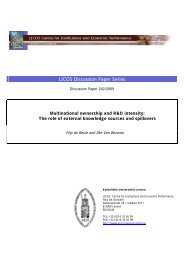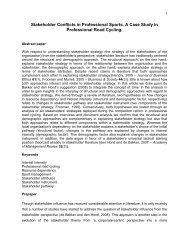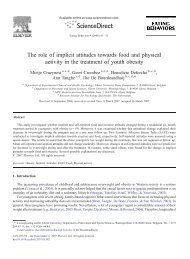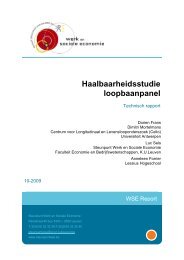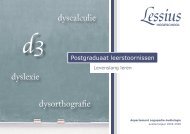View/Open - Lirias@Lessius
View/Open - Lirias@Lessius
View/Open - Lirias@Lessius
You also want an ePaper? Increase the reach of your titles
YUMPU automatically turns print PDFs into web optimized ePapers that Google loves.
132<br />
M. ERGÜN OLGUN, DIRK ROCHTUS<br />
If the international community<br />
does not want the Turkish<br />
Cypriots to opt for the Kosovo<br />
route, the Greek Cypriot<br />
people need to be seriously<br />
incentivized as early as possible,<br />
towards a genuine powersharing<br />
deal<br />
almost ideal conditions under which,<br />
in contrast to Cyprus, the communities<br />
experienced no violent rift in their relation;<br />
(3) the Belgian case is the result of<br />
a constructive evolutionary process that<br />
combined territorial and communitarian<br />
features; (4) the social and political<br />
purpose of federalizing Belgium was not<br />
to bring two long-divided communities<br />
into closer interaction with one another,<br />
but rather to separate them still further by creating large areas of competency in<br />
which they would be politically autonomous; (5) beyond the legal texts, the Belgian<br />
system actually depends very largely on its non-constitutional aspects, such<br />
as the structure of the party system, the role of interest groups and media, and the<br />
nature of political culture(s); and finally (6) the Belgian model of federalism was<br />
hammered out by the Belgians themselves and not by outside patrons. Bahcheli<br />
and Noel conclude by saying that none of these conditions exist in Cyprus; that<br />
institutions alone cannot manufacture a willingness to cooperate where non exists;<br />
and that a bi-communal and con-societal federation brought into existence<br />
by outside pressures and inducements would likely fare no better than previous<br />
failed power-sharing experiments. 19<br />
Cyprus still presents the unique case of a failed partnership experience where<br />
the less privileged partner (the Turkish Cypriot side) is still seeking a new partnership<br />
relationship with the other party in a history of conflict.<br />
President Talat, a firm believer in an equality and territoriality based partnership<br />
solution, has often repeated that this is the last chance for establishing a federal/confederate<br />
relationship between the two peoples of the Island.<br />
Let us hope that in the new round of Cyprus talks both President Hristofias<br />
and President Talat, two old comrades, will draw lessons from EU member state<br />
Belgium’s multi tier governance experience, and also bear in mind what it takes to<br />
establish, run and sustain equality and territoriality based bi-ethnic partnerships.<br />
We also hope that these lessons will be endorsed by the respective peoples of the<br />
island, thus triggering a new culture of co-existence and evolutionary change.<br />
Endnotes<br />
1. Following the election of Demetris Hristofias as Greek Cypriot President, Turkish Cypriot<br />
President Mehmet Ali Talat and the new Greek Cypriot President met on 21 March 2008 and



